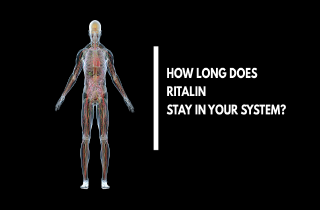Ritalin doesn’t stay in the body for very long. The drug’s half-life is 3 hours at the most, meaning that Ritalin leaves the body within a few days. Can Ritalin show up on a drug test? NO, not on a standard 5 panel, but Ritalin can show up positive for a drug screen panel for amphetamines. Further, drug detection times can depend on a number of factors – how the drug was taken, how often a person takes the drug, and the person’s body time and metabolism. We review here and invite your questions about Ritalin in the system at the end.
Main Ritalin Uses
Ritalin is used to treat ADHD in adults and children. It contains methylphenidate, a stimulant medication. Paradoxically, Ritalin has a calming, focusing effect in people with ADHD. However, in those without the condition, Ritalin can cause agitation and restlessness. And people who get high on Ritalin abuse it for its euphoric effect.
How Do You Take Ritalin?
Ritalin comes in an immediate, sustained, and extended release tablet. Although Ritalin is intended to be taken orally, some people abuse Ritalin by crushing the pills and then snorting them. Snorting Ritalin is very dangerous, particularly with the sustained and extended release.
Peak Levels And Half Life Of Ritalin
The peak levels and half life of Ritalin depend on the formulation. But with the immediate release version of Ritalin, methylphenidate reaches peak levels in the blood in about 2 hours. And methylphenidate from Ritalin tablets is eliminated from plasma with an average half-life of about 3.5 hours. As a comparison, in children the average half-life of methylphenidate is about 2.5 hours, with a range of about 1.5 – 5.0 hours.
Ritalin Drug Testing: How Long Does Ritalin Stay In The Body?
Because of how quickly Ritalin is metabolized, it doesn’t stay in the body for very long. Even the extended and sustained release formulas should clear a person’s system within a few days of being taken. Ritalin can still be tested for and detected in the system using a variety of methods, including blood, urine and hair sample drug tests.
How Long Does Ritalin Stay In Blood?
Because of its relatively short half life, Ritalin does not stay in the blood more than a day. After 24 hours, a urine test might be more accurate.
How Long Does Ritalin Stay In Hair?
Ritalin can be detected in hair for at least 90 days. However, the detection window for hair samples depends on the length of someone’s hair and the amount of the drug they’ve taken. Heavy or extended use will be easier to detect in hair screens for Ritalin than occasional use.
How Long Does Ritalin Stay In Urine?
Ritalin can be detected in urine for 1-2 days after dosing. Ritalin will be detectable slightly longer if you’ve taken the sustained or extended release version of the drug, simply because not all of the medication is released with the initial dose. Sometimes Ritalin methylphenidate metabolites can linger in the body longer depending on factors like weight or body mass.
Ritalin And Addiction
Ritalin is addictive when it is not used for a legitimate medical purpose. Addicts can develop a tolerance to Ritalin, and start taking more Ritalin achieve euphoric side effects. This can lead to withdrawal and can increase the risk of overdose.
Problems With Ritalin?
If you struggle with Ritalin addiction, please see a doctor for help. There may be therapies which can help you quit taking Ritalin. Being open with friends and family about your struggles with Ritalin will help you build a support network that can help keep you accountable.
Ritalin In Your System Questions
If you are looking for help with methylphenidate (Ritalin) addiction, you can find answers to your many questions and learn what happens during Ritalin addiction treatment programs in our comprehensive guide on Methylphenidate Addiction Treatment.
In case of any additional questions for Ritalin in your system use the question section below. We will be happy to respond to your questions with a personal and prompt response.











Related Posts